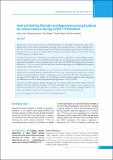Please use this identifier to cite or link to this item:
https://hdl.handle.net/20.500.14356/1003| Title: | Internet Gaming Disorder and Aggression among Students on School Closure during COVID-19 Pandemic |
| Authors: | Joshi, Alisha Sharma, Kalpana Sigdel, Dipa Thapa, Taniya Mehta, Rajkumar |
| Citation: | JoshiA., SharmaK., SigdelD., ThapaT., & MehtaR. (2022). Internet Gaming Disorder and Aggression among Students on School Closure during COVID-19 Pandemic . Journal of Nepal Health Research Council, 20(01), 41-46. https://doi.org/10.33314/jnhrc.v20i01.3737 |
| Issue Date: | 2022 |
| Publisher: | Nepal Health Research Council |
| Article Type: | Original Article |
| Keywords: | Aggression COVID-19 pandemic internet gaming disorder |
| Series/Report no.: | Jan-March, 2022;3737 |
| Abstract: | Abstract Background: The Corona Virus Disease (COVID-19) pandemic has significantly disrupted the regular school-going activities of the students, predominantly increasing internet gaming activities to endure significant stress. Excessive involvement in internet gaming brings deviant behaviour, especially aggression among the students. Hence, this study aimed to assess the internet gaming disorder and aggression among the students on school closure during COVID-19 pandemic in Chitwan, Nepal. Methods: A web-based cross-sectional survey was conducted among 417 students from secondary and higher secondary level who studied in two private schools of Chitwan district. Sample were selected using simple random sampling technique and structured questionnaire, i.e. Internet gaming disorder scale- short form (IGDS9-SF) and Aggression questionnaire (Buss & Perry, 1992) were used to collect the data via web-based through Google Form. Obtained data were analysed using descriptive and inferential statistics. Results: Out of 417 students, the mean age was 17 (±1.411) years, 278 (66.7%) were male and 150 (36.0%) were studying in twelve standard. Majority of students 405 (97.1%) were non-disordered gamers whereas only 12 (2.9%) students were disordered gamers. Students’ overall aggression score was 57.79% where the verbal aggression score was higher (66.33%) followed by hostility (61.41%) and anger (56.80%). Further significant positive relationship was found between scores on online gaming disorders and aggression (r=0.239, p<0.001). Conclusions: Internet gaming disorder and aggression are common among the students during COVID-19 pandemic. Therefore, educational institutions and concern authorities need to organize awareness programs and effective psychosocial intervention approaches for students to enhance the knowledge regarding harmful use of internet game, IGD, to cope with stress and aggression as well as to enhance the adoptive behaviour. Keywords: Aggression; COVID-19 pandemic; internet gaming disorder. |
| Description: | Original Article |
| URI: | http://103.69.126.140:8080/handle/20.500.14356/1003 |
| ISSN: | Print ISSN: 1727-5482; Online ISSN: 1999-6217 |
| Appears in Collections: | Vol. 20 No. 01 (2022): Issue 54 Jan-March, 2022 |
Files in This Item:
| File | Description | Size | Format | |
|---|---|---|---|---|
| 3737-Manuscript-27865-1-10-20220606.pdf | Fulltext Download | 249.06 kB | Adobe PDF |  View/Open |
Items in DSpace are protected by copyright, with all rights reserved, unless otherwise indicated.
